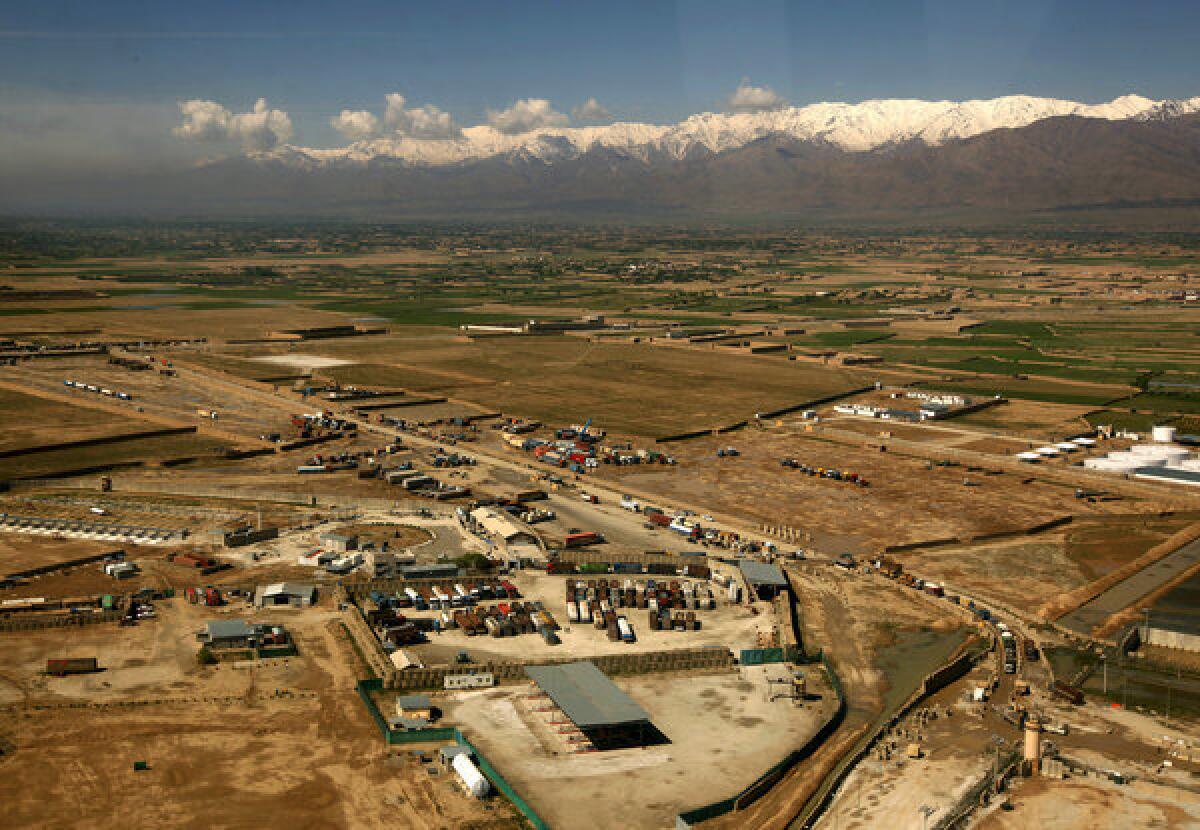Army accused of allowing blacklisted Afghan contractor inside prison

- Share via
KABUL, Afghanistan -- An independent federal watchdog has accused the U.S. Army in Afghanistan of allowing access to a prison complex by an Afghan contractor identified by a Pentagon command as having assisted insurgents by providing bomb-making components.
The contractor, which had been blacklisted by the U.S. Central Command in September 2012, was allowed inside the American-run prison next to Bagram Air Field for two days two months later, according to the Special Inspector General for Afghanistan reconstruction.
John F. Sopko, who heads the agency, known as SIGAR, said the incident shows a failure by the U.S. military to block contractors suspected of helping insurgents -- and highlights communication breakdowns in passing the word about blacklisted contractors. The allegations were detailed in a so-called warning letter sent Nov. 8 to Defense Secretary Chuck Hagel, which was released to the public Wednesday.
A subsidiary of the Zurmat Group, an Afghan company, was awarded a subcontract by an Afghan construction contractor to inspect work done at the Parwan Justice Center Complex, which the U.S. turned over to Afghan control this year. Sopko said the contractor, CLC Construction, apparently was not told that Zurmat had been blacklisted by Central Command and, in April 2012, by the U.S. Department of Commerce.
SIGAR requested in September 2012 that Zurmat be banned from receiving contracts. The agency did not specify how much Zurmat was to be paid under its subcontract for the prison job.
Zurmat employees had access to the prison, where the U.S. held insurgents and accused terrorists, for two days in November 2012, according to the letter. Sopko said Zurmat had provided materials to insurgent networks for roadside bombs, which have been the single largest killer of U.S. and international troops in Afghanistan.
“This lapse in security highlights the immediate need for a simple process to ensure than individuals and companies identified as supporters of the insurgency are prevented from accessing U.S. and coalition-controlled facilities,” Sopko wrote.
Since September 2012, SIGAR has identified 43 foreign companies and individuals as having provided some form of support to insurgents in Afghanistan. Sopko said the U.S. Army has refused to “debar,” or blacklist, any of the 43 from working for the U.S. government.
The Army office responsible for debarment and suspension has said doing so would violate due process rights, Sopko said, because much of the evidence against the companies and individuals involves classified materials that may not be divulged.
“Based on the evidence available in these cases, the Army’s position is legally dubious, contrary to good public policy and contrary to our security goals in Afghanistan,” Sopko wrote.
SIGAR discovered Zurmat’s role in May 2013 while investigating alleged construction defects at the prison complex, funded jointly by the Defense Department and the Department of State. SIGAR was looking into suspected structural problems in a courthouse being built by CLC Construction, according to Sopko.
Sopko asked Hagel to “bring common sense to the Army’s suspension and debarment program.”
Public affairs officers for the Army and the Pentagon did not immediately respond to a request for comment.
ALSO:
Palestinian accused of stabbing napping Israeli soldier to death
6 of 14 new states on U.N. Human Rights Council called abusers
U.N. denounces mortar attacks on schools in the Syrian capital
Twitter: @DavidZucchino
More to Read
Sign up for Essential California
The most important California stories and recommendations in your inbox every morning.
You may occasionally receive promotional content from the Los Angeles Times.











